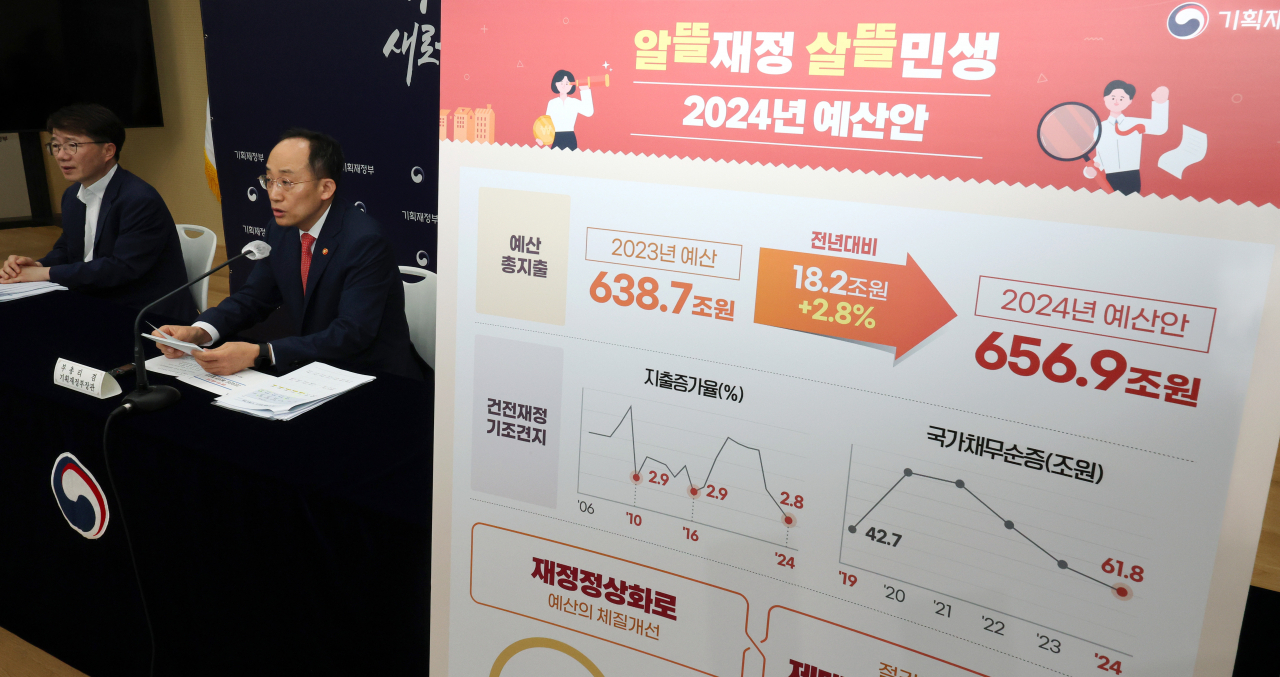Unsecured national debt to soar to nearly W800tr next year
2024 budget demonstrates smallest on-year growth in almost two decades
By Song Seung-hyunPublished : Sept. 3, 2023 - 17:58

Korea's national debt that relies solely on taxpayers' funds for repayment is forecast to soar to a staggering 792.4 trillion won ($601 billion) next year, which more than doubled compared to the figure in 2017, according to a government report released Sunday.
In 2017, the unsecured debt amounted to 374.8 trillion won, and over the course of seven years, this figure has steadily climbed, now approaching 800 trillion won.
Among the forthcoming 1,190 trillion won of total national debt projected for 2024, the Korean government has set apart a specific category for this particular unsecured debt that is not backed by assets in its 2023-2027 National Debt Management Plan report, as it places a notable burden on the nation.
Such unsecured debt is required to be repaid through taxes because it is not backed by assets like foreign exchange stabilization fund bonds and national housing bonds.
The proportion of the debt that will rely on tax for repayment is expected to account for 66.2 percent of the total 2024 national debt, and that portion will continue to climb.
That figure is expected to increase from 63.3 percent in 2022 to 63.6 percent in 2023. Subsequently, in 2025, it is predicted to make up 66.7 percent of the total debt, followed by 67.6 percent in 2026 and ultimately reaching 68.3 percent in 2027.
The projected debt for 2024 is also higher than this year's estimate of 721.3 trillion won in the specific category.
The share of debt with backed assets is expected to decrease, dropping from 36.4 percent this year to 33.8 percent next year and further to 31.7 percent by 2027.
As the national debt continues to grow, annual expenditures on interest are also expected to steadily increase, the report said.
An average 11 percent increase in interest payments is anticipated, with figures projected to rise from 22.9 trillion won this year to 27.4 trillion won next year, 29.6 trillion won in 2025, 32.3 trillion won in 2026 and 34.8 trillion won in 2027.
This means the government will need to allocate 147 trillion won for interest payments on the national debt over the next five years.
This government’s report followed Tuesday's Cabinet approval of the 2024 budget proposal, totaling 656.9 trillion won, marking the smallest on-year growth in nearly two decades.
"We cannot simply ignore the increasing fiscal deficit. It is why next year we are tightening our belt," said Finance Minister Choo Kyung-ho during a meeting at the National Assembly in Seoul on Thursday.
The size of the second budget proposal presented by the Yoon Suk Yeol administration is an expansion of 2.8 percent from this year's 638.7 trillion won.
"If we continue to accumulate more debt, we will not be able to maintain sound fiscal management and uphold our credibility globally," Choo added.
In this situation, it becomes more and more crucial for the government to address the decline in tax revenues and take measures to enhance them.
Korea initially set a tax revenue target of 400.5 trillion won for the year, but its first-half takings were 40 trillion won short of what was planned for the period, at 178 trillion won.
Some industry sources' projections suggest that the revenue shortfall could exceed 50 trillion won, or even reach 60 trillion won this year.
To address the shortcoming, the government is preparing the largest-ever injection from the public capital management fund, signaling its ability to navigate the tax revenue challenge without an extra budget.
The public capital management fund, established by the government to manage public funds, operates as a central account that borrows from surplus funds and lends money to areas in need.
Through this fund, the Finance Ministry appears to have secured more than 5 trillion won.
"Through receiving substantial deposits previously lent to other funds, we have managed to secure a significant sum," a government official said.








![[Hello India] Hyundai Motor vows to boost 'clean mobility' in India](http://res.heraldm.com/phpwas/restmb_idxmake.php?idx=644&simg=/content/image/2024/04/25/20240425050672_0.jpg&u=)










